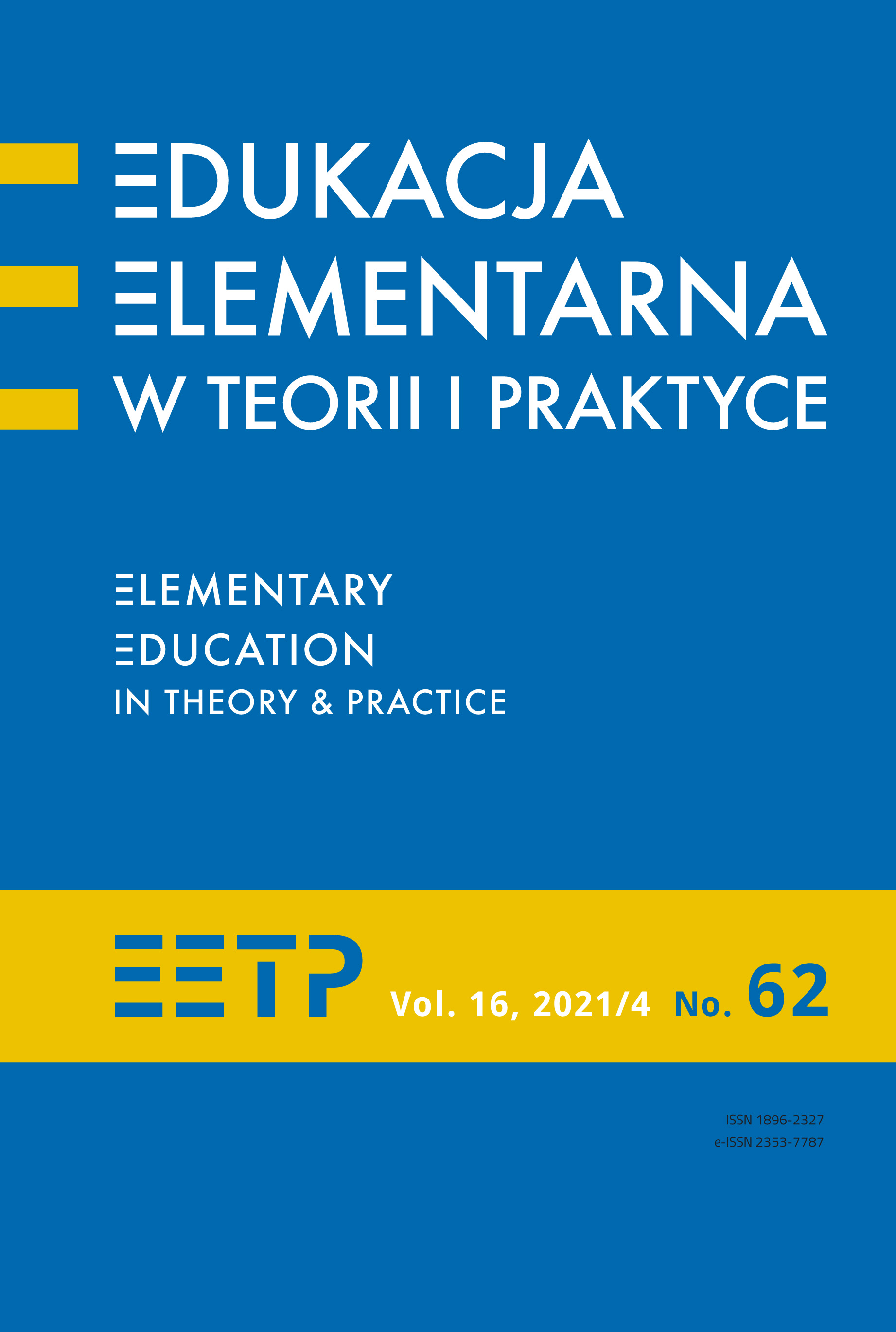Wybrane konteksty funkcjonowania społeczno-zawodowego nauczyciela przedszkola
Abstrakt
Nauczyciel przedszkola to zawód, którego wykonywanie zależy od wielu czynników. Tym, co w pierwszym rzędzie wyznacza jego pracę, jest świat dziecka. Nauczyciel wkracza weń na bardzo wczesnym etapie jego życia i to od jego kompetencji zależy, na ile będzie umiał wspierać rozwój swoich wychowanków. Złożona i dynamiczna rzeczywistość społeczna i oświatowa również jest źródłem zadań dla nauczyciela. Celem artykułu jest analiza złożonych uwarunkowań, w których nauczyciel przedszkola wypełnia swe zawodowe powinności. Wskazuje to na ważność jego misji zarówno wobec dziecka, jak i społeczeństwa. Analizując funkcjonowanie zawodowe nauczyciela przedszkola, można zauważyć, że jego praca przebiega w różnych kontekstach. Pierwszy kontekst to oczekiwania społeczne wobec nauczyciela. Społeczeństwo wymaga, by był to kompetentny nauczyciel, otwarty na potrzeby dziecka, zdolny wspierać jego rozwój, a także pomocny rodzinie. Oczekuje się też, że nauczyciel przedszkola będzie integrował wpływy wychowawcze z różnych środowisk oraz że będzie uosobieniem określonych wartości.Drugi kontekst to role zawodowe nauczyciela przedszkola. W toku pracy wychowawczo-dydaktycznej jest on: wzorem osobowym, przewodnikiem dziecka, diagnostą, terapeutą, organizatorem współpracy z rodziną i środowiskiem, członkiem zespołu nauczycielskiego, zarządcą placówki i badaczem. Trzeci kontekst to wymogi wynikające z rozwoju zawodowego. Przejawia się on w takich formach aktywności nauczyciela, jak: adaptacja społeczno-zawodowa, identyfikacja społeczno-zawodowa, stabilizacja społeczno-zawodowa, dokształcanie i doskonalenie społeczno-zawodowe, sukcesy społeczno-zawodowe, rekwalifikacja społeczno-zawodowa, stopniowy regres aktywności społeczno-zawodowej, wycofanie się z czynnej pracy społeczno -zawodowej i okres reminiscencji i refleksji zawodowej. Aby sprostać wymogom zawodowym, potrzebne jest dobre przygotowanie nauczyciela przedszkola w toku studiów oraz jego ustawiczna, samodoskonaląca aktywność.
Bibliografia
Błaszkiewicz R. (2001). Motywacja nauczycieli do doskonalenia zawodowego, „Nauczyciel i Szkoła”, nr 3 4, s. 69 75.
Bulera M., Żuchelkowska K. (2006). Edukacja przedszkolna z partnerskim udziałem rodziców, Toruń: Wydawnictwo Edukacyjne „Akapit”.
Czarnecki K. M., Karaś S. (1996). Profesjologia w zarysie (rozwój zawodowy człowieka), Radom: Wydawnictwo Instytutu Technologii Eksploatacji.
Czarnecki K. M. (2010). Profesjologia. Nauka o zawodowym rozwoju człowieka, Sosnowiec: Oficyna Wydawnicza „Humanitas”.
Czarnecki K. M. (2016). Profesjologia. Nauka o profesjonalnym rozwoju człowieka, wydanie drugie, Sosnowiec: Oficyna Wydawnicza „Humanitas”.
Duraj-Nowakowa K. (2000). Nauczyciel. Kultura – osoba – zawód, Kielce: Wydawnictwo Wyższej Szkoły Ubezpieczeń.
Duraj-Nowakowa K. (2012). Studiowanie literatury przedmiotu, Kraków: Akademia Ignatianum–Wydawnictwo WAM.
Guz S. (1996). Edukacja przedszkolna w okresie przemian, Warszawa: Wydawnictwo Wyższej Szkoły Pedagogicznej TWP.
Jędrzejewski S. (1985). Nauczyciel przedszkola, [w:] Kwiatowska M. (red.), Podstawy pedagogiki przedszkolnej, Warszawa: Wydawnictwa Szkolne i Pedagogiczne.
Kos E. (2016). Przebieg procesu pedagogicznej diagnozy ucznia w pracy nauczyciela wychowawcy, „Nauczyciel i Szkoła”, nr 1, s. 60.
Klim-Klimaszewska A. (2005). Pedagogika przedszkolna, Warszawa: Polski Instytut Wydawniczy.
Klim-Klimaszewska A. (2010). Pedagogika przedszkolna, Warszawa: Instytut Wydawniczy ERICA.
Kwaśniewska M. (2011). Aktualny stan wychowania przedszkolnego w Polsce, [w:] Karbowniczek I., Kwaśniewska M., Surma B. (red.), Podstawy pedagogiki przedszkolnej z metodyką, Kraków: Akademia Ignatianum, Wydawnictwo WAM.
Kwiatkowska H. (2007). Kondycja zawodowa nauczycieli – geneza – przejawy –konsekwencje, [w:] Lewowicki (red.), Gorące problemy edukacji w Polsce, ekspertyzy i opinie, Warszawa: Wydawnictwo Komitetu Nauk Pedagogicznych PAN i Wyższej Szkoły Pedagogicznej ZNP.
Nowak B. (2009). Nauczyciel jako terapeuta w traumatycznych wydarzeniach w życiu ucznia, [w:] Przygońska E., Chmielewska I. (red.), Nauczyciel wobec wyzwań współczesności. Doświadczenia – badania – koncepcje, Łódź: Wydawnictwo Wyższej Szkoły Humanistyczno-Ekonomicznej w Łodzi.
Paprotna G. (2015). Społeczno-pedagogiczne uwarunkowania funkcjonowania zawodowego nauczycieli przedszkoli, Kraków: Górnośląska Wyższa Szkoła Pedagogiczna im. Kardynała Augusta Hlonda w Mysłowicach, Akademia Ignatianum w Krakowie.
Surma B. (2011a). Metody i narzędzia diagnostyczne, [w:] Karbowniczek J., Kwaśniewska M., Surma B. (red.), Podstawy pedagogiki przedszkolnej z metodyką, Kraków: Akademia Ignatianum, Wydawnictwo WAM.
Surma B. (2011b). Uczestnicy (podmioty) procesu edukacyjnego w przedszkolu, [w:] Karbowniczek J., Kwaśniewska M., Surma B. (red.), Podstawy pedagogiki przedszkolnej z metodyką, Kraków: Akademia Ignatianum, Wydawnictwo WAM.
Szempruch J. (2001). Nauczyciel w zmieniającej się szkole, Rzeszów: Wydawnictwo Oświatowe „Fosze”.
Szempruch J. (2017). Przygotowanie edukacyjne człowieka do funkcjonowania w warunkach współczesnej cywilizacji, „Problemy Profesjologii”, nr 1, s. 16 18.
Copyright (c) 2021 Edukacja Elementarna w Teorii i Praktyce

Utwór dostępny jest na licencji Creative Commons Uznanie autorstwa – Bez utworów zależnych 4.0 Międzynarodowe.
1. Autor zgłaszając swój artykuł oświadcza, że jest Autorem artykułu (zwanego dalej Utworem) i:
- przysługują mu wyłączne i nieograniczone prawa autorskie do Utworu,
- jest uprawniony/a do rozporządzania prawami autorskimi do Utworu.
Oświadcza, że nie narusza praw autorskich osób trzecich i praw prawnych.
Oświadcza, że nie występuje żaden konflikt interesów.
2. Udziela Uniwersytetowi Ignatianum w Krakowie nieodpłatnej, niewyłącznej, nieograniczonej terytorialnie licencji do korzystania z Utworu na następujących polach eksploatacji:
- utrwalania utworu w formie papierowej, a także na nośniku cyfrowym lub magnetycznym;
- zwielokrotnienia utworu dowolną techniką, bez ograniczenia ilości wydań i liczby egzemplarzy;
- rozpowszechniania utworu i jego zwielokrotnionych egzemplarzy na jakimkolwiek nośniku, w tym wprowadzenia do obrotu, sprzedaży, użyczenia, najmu;
- wprowadzenia utworu do pamięci komputera;
- rozpowszechniania utworu w sieciach informatycznych, w tym w sieci Internet;
- publicznego wykonania, wystawienia, wyświetlenia, odtworzenia oraz nadawania i reemitowania, a także publicznego udostępniania utworu w taki sposób, aby każdy mógł mieć do niego dostęp w miejscu i czasie przez siebie wybranym;
- w zakresie praw zależnych do Utworu, obejmujących w szczególności prawo do dokonania koniecznych zmian w Utworze, wynikających z opracowania redakcyjnego i metodycznego, a także do dokonania tłumaczenia Utworu na języki obce.
Udzielenie licencji następuje z chwilą przekazania Utworu na rzecz Uniwersytetowi Ignatianum w Krakowie. Uniwersytet Ignatianum w Krakowie jest uprawniony do udzielania dalszych sublicencji do Utworu, w zakresie udzielonego prawa. Licencja jest ograniczona czasowo i zostaje udzielona na okres 15 lat, licząc od daty jej udzielenia.
Wyraża się zgodę i zachęca autorów do publikacji ich tekstu w Internecie (np. w repozytorium instytucji lub na jej stronie internetowej) przed lub podczas procesu składania tekstu jako, że może to prowadzić do korzystnych wymian oraz wcześniejszego i większego cytowania opublikowanego tekstu (Patrz The Effect of Open Access). Zalecamy wykorzystanie dowolnego portalu stowarzyszeń badawczych z niżej wymienionych:




